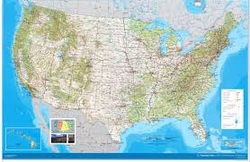 When Mother and Daddy lived in an assisted-living facility, and at times next door with skilled nursing care, I visited them nearly every day. I was blessed to live in the same town, about thirty minutes away, so visiting never became a burden. Many residents or patients have no family or friends close by, no one who can come on a regular basis to sit a spell, to bring comfort with their very presence, or to see with their own eyes the changes that are taking place.. Even though I saw my daddy on a regular basis, and knew he had some dementia, I didn’t realize how bad it was because my mother didn’t tell me, and perhaps I didn’t want to see it. Neither of my parents got enough rest because he would awaken during the night, get out of bed, turn on all the lights and perhaps shave or get partly dressed. And when Daddy finally crawled back into bed, he never remembered his oxygen tube hanging on the bedpost. Mother would try to stay awake to remind him to put it on. And later if she awoke and asked him if he was wearing it, he always said yes, even when he was not. I was not faced with being a long-distance caregiver, but many have no other choice. If that is the case, what can he or she do? I recently came across a blog that discussed the particular needs of long-distance caregiving. I am fortunate I never had the additional stress that long-distance caregivers face. I’ve known some children who deny their parents are declining in either mental or physical health or both, and don't believe any action is necessary. After all, when they talk on the phone, everything seems as normal as usual. But many times, this is not the case. I think most parents, especially if they’re from the “greatest generation,” don’t want to become a burden to their children. They might be afraid of getting older and losing their independence, but they keep that fear to themselves. They want to protect their children from becoming a caregiver. They don’t speak about the changes in their lives, perhaps getting lost on a route that was once familiar or falling for no apparent reason or like my parents, suffering from sleep deprivation. When asked how they’re getting along, they answer, “We’re doing just fine.” And the children believe them because that’s what they want to believe. If you live nearby someone who needs help, like I did, or if you do not, and cannot, there are options for you as a long-distance caregiver.
0 Comments
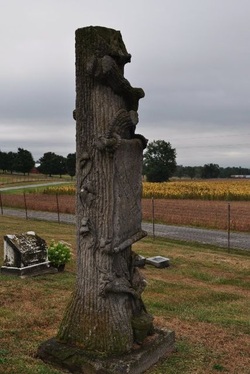 How does a writer of fiction name his characters? Out of thin air? Not likely. Here are some possibilities and I’ve used them all. Newspapers Graveyards Research on Internet or in books Listening Friends and family Stu Summers, author of Summer’s Love, used his own name and this character is a famous author. I’ve never met Stu so I can’t say if their personalities are the same. That’s the key, I think. The name has to suit the character. Sometimes the name comes first, other times the personality. In my book, At The Bridge, a strong, handsome man--tan and muscular because he has labored in the fields--one day brings a basket of strawberries to the residents sitting on the porch of a retirement home. I knew his name was Jack, but he needed a last name. One of the ladies that day swoons over his presence. He often has that effect on women. His girlfriend, Shirley Monroe, the manicurist at the Kut’N Loose, calls him “Baby.” Alice, who was also on the porch that day, thinks he looks like Jesus, because of his long, thick hair. His last name? Lovingood. Jack’s girlfriend, Shirley, is a blonde and even though her hair is a mound of teased fluff, don’t be fooled into thinking her elevator doesn’t go to the top floor. Rather she is full of practical wisdom that women often find in beauty shops. She is a large-boned woman with big feet. Her perfume is loud and so is her laugh. Her last name is Monroe because she reminded me of a long ago star named Marilyn. And so it goes. Names are fun, but names are also important and not taken lightly. My main character in At The Bridge, Agnes Marie Hopper, has the spunky spirit of my mother. I love the name Agnes, but the rest of her name came straight from my mother. She never had a middle name so she gave herself Marie. Now that takes courage. Her maiden name was Hopper and somehow it just seemed to fit Agnes. She is small and petite yet strong and agile. She has red hair though it now comes from a bottle. She is a widow who still grieves for her husband, Charlie, who was a small tobacco farmer. At the beginning of my story, Agnes lives alone, except for her pet pig, Miss Margaret, who is a great comfort to her. The name seems like a dignified, southern name to me. I first heard it used for a relative’s cat. I knew I would have to use it some day. Where did your name come from? If you could choose your own, what would it be? My daddy said he just “thunked” mine up. My sister’s middle name, Rae, came from a family friend. I have passed that name to my son as Ray. Did you know one day we will have new names? Scripture says so and I wrote a devotional on that topic. The post date is Sunday, June 29 and if you would like to read it, or any daily devotion written by various authors, you can go to: christiandevotions.us Names are indeed important.  June 21, 2014 Happy Baby Boomer Recognition Day For years I thought I qualified as a “Baby Boomer,” but I don’t. I’m too old. I was born in 1943 when the official birth years are 1946-1964. Even so, the fifties made a lasting impression on my life. For one thing our family acquired our first television set for our very own living room. Before this we shared a community one perched on top of the meat counter in the mining camp’s commissary. Mother, as store manager, sold sandwiches to the always-hungry crowd. And before that tiny black-and-white graced the meat counter, it was toted up to the top of the tallest mountain around, wrapped in a soft quilt no less, and hooked up to an enormous antenna. I had to imagine the thrill of being there because only the hearty men and women made that climb. Mother and Daddy were among them. They didn’t return until the station signed off and the next night they would do it again. When we had our own television, maybe a Philco, what did we watch? Anything from boxing to Laurence Welk to the Little Rascals. If our neighbors joined us on a weekend night, we fixed cheese and crackers and sweet pickles and maybe passed around RC’s and peanuts or homemade fudge. Good times. If we were lucky, we caught a glimpse of Elvis gyrating on stage and singing Love Me Tender, You Ain’t Nothing But A Hound Dog, or Jailhouse Rock. Daddy’s older brother, Uncle Vic, said this vulgar man would be the ruination of America. We laughed at the time, but maybe he was right. Did Elvis start us down a slippery slope? Elvis’s moves were shocking at first--until we got used to them. Now they are nothing compared to what others sometimes display today—their crude sexual behavior in front of millions of people. Will we come to accept that as normal too? Do you ever wonder how far our behavior will go? Don’t get me wrong. I loved listening to Elvis and enjoy his music even more so today, especially his hymns. But I guess he thought he had to get our attention first. And he did. What do you remember about those years? Did you love the Beatles? Were you a flower child or wish you could have gone to Woodstock? Are you a “Baby Boomer or, like me, are you too old to qualify?” 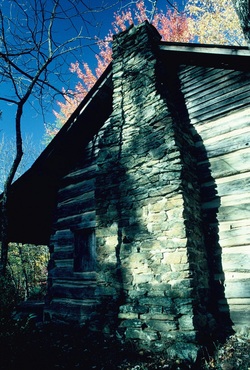 Where do story ideas come from? Sometimes, I can trace a particular scene or even a whole chapter back to something that actually happened, perhaps something I captured in a journal. Other times, I don’t have a clue. For instance, my first novel was set in Appalachia—logical since I grew up there, but it was not an autobiography. In the opening scene, granny dies sitting in a porch swing shelling peas. One spring day when Hattie, her granddaughter, visits the grave to bring fresh flowers, the wind begins to skip along the tops of the tall pines and she hears, “Dreams torn asunder may never mend . . .never mend.” Where in the world did those words come from? Was Granny trying to tell her something or was the wind playing tricks? Another main character in A Faraway Place is Birdman. He is an old transit who tries to take up residence in the miners’ bathhouse. He is based on truth. Turkey Pen mining camp did have a vagrant living in our bathhouse. I was terrified of him. Families took turns feeding him and when mother fixed him a plate heaping with beans, cornbread, and fried potatoes, my sister and I had to deliver it. I’m sure he was harmless, but sometimes I had an overactive imagination. This first book was long and rambling and may never see the light of day, but that’s all right. I cut my writing teeth on that book. We learn to write from the very act of writing. From that experience of living and breathing as Hattie Mae Sizemore, I now realize my work is more character-driven than plot-driven and that’s ok too. I fell in love with those characters and continue to love them to this day. Do you keep a journal? I often do, but not every day. I read one time that if I will write down impressions, experiences, feelings, thoughts, anything really, those words will be there when I need them—much like salting down fresh fish and storing them in a barrel. Preserved until needed. I’m going to journal for the next seven days straight, no excuses, just do it. I’ll report back on June 23, 2014. How about you? Do you journal? Why or why not? 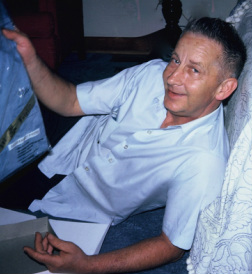 Daddy said he grew up “rough as a hickory nut.” He was born in 1918 in “Bloody Harlan,” KY where men often settled arguments with the guns they toted. Pine coffins, built and stacked in the town’s hardware store, waited for the undertaker. From a family of coal miners, he followed suit. He worked in mining camps with names like Yancey, Arjay, Turkey Pen, Blanche, and Cow Branch. I can see him on a typical workday when he heads to the mines before first light, before a rooster crows, before morning glories open their blooms. Sometimes two or three gaunt dogs follow him, whining for attention. All strays, he has tended to their worms, their mange and wounds. He treats them like pedigrees. His work boots crunch along a well-worn path. His lunch pail, with bologna sandwiches and a Moon Pie, thumps against his leg as he heads down one mountain and up another. When he enters a labyrinth of dark, damp tunnels, he splashes through rancid water. A tiny carbine lamp clamped onto his cap casts a golden glow on the dust suspended in the air. When he reaches his workstation he sets his lunch bucket nearby and places a rock on its lid to keep the rats out. Timbers creak and groan overhead. As a child, I knew nothing of the dangers he faced. Somehow he found time to show my sister and me the beauty of summer storms rumbling over the mountains, a pink lady slipper poking through a brown-leaf carpet, and he planted cotton in our hillside garden—so we could see it, touch it, compare it to the textbook drawing. Often he interceded for his two girls. One summer day, we built a clubhouse and nailed it to one side of our home. Since daddy worked long hours, as did Mother as manager of the camp’s commissary, we basically entertained ourselves—after finishing our chores. That evening Mother surveyed our construction and said it must come down at once, if not sooner. Daddy said, “Now, Edith, look what a good job they did and I bet they have blisters on every finger. Let them keep it up a day or two.” And so we did. That was my daddy. He was both a gentle man and a gentleman. He loved the simple things of life, his family, Juicy Fruit gum, the Kentucky Wildcats, and pinto beans and cornbread. Many were blessed with his presence on this earth for 93 years. 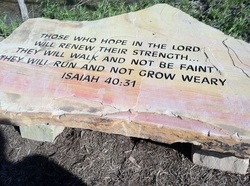 Perseverance One Sunday, twenty-plus years ago, my eye caught an ad for autobiographical and creative writing classes offered at Baptist Hospital. They were for anyone in the community, except for one hitch. The students had to be seniors, fifty-five years or more. I didn’t qualify, but the class description had peaked my interest. I called to inquire. The answer was no, I couldn’t come. I called again and again. Finally, I tried one more time. The same lady answered, and after a long sigh, said, “Well, ok, I guess it will be alright. But you can’t tell anyone you’re not old enough.” I was in. These classes offered solid instruction and weekly assignments, but their most valuable asset was a place for students to share their writings without critical feedback. The beginning of a writer’s journey is a fragile time. Every writer needs a safe place to practice, where he or she can create without fear until a true voice emerges out of what is sometimes a mess. The writing instructor, Trish, and I became close friends. She edited my work before I submitted anything. She rejoiced with me when an article found a home, and when I faced the inevitable rejections she would not let me give up. I joined writer’s groups, like the South Carolina Writer’s Workshop. We met at a local library around long tables pushed together. People could share their work, if they chose. Those who did received constructive criticism, though not always in a kindly manner. For months I only listened. The first time I read a short story to my fellow writers, I was thankful it was our custom to remain seated. I pressed my knees into the bottom of the table to keep from shaking. I don’t remember the name of the story, but I survived and hopefully learned from the experience. Did I ever get discouraged? Yes indeed. And there was a time I gave up on writing all together. For any writer: How did you keep going? Did you ever quit, or want to? 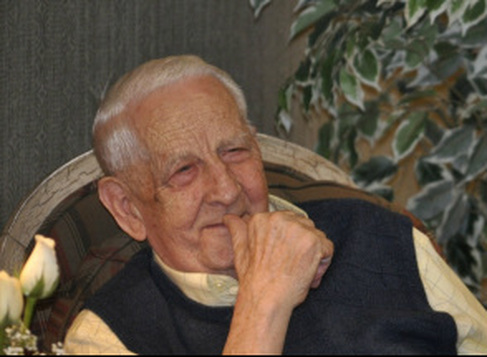 When Daddy crafted a sign and planted it along my pristine new driveway leading to my vacation mountain home, I’m sure he could hardly wait for my husband and I to return from South Carolina. The sign announced this 64-bypass was now a toll road and it listed who, or what animal, had to pay certain amounts--but turkeys were free. Maybe he decided this was appropriate because we had named our place Turkey Creek Farm. He attached a tin can at the bottom of the sign. Sometimes we would discover a dime or quarter there, but most of our guests must have been turkeys. My first article, Appalachian Humor, grew from this experience. After that, I began to devour books on the craft of writing and continued to write. One day Mother said, “We don’t have any secrets anymore! ” I think she was afraid to see what might be coming next as my human-interest stories began appearing in our South Carolina paper, The State. Daddy took it all in stride and even carried my stories around in his shirt pocket. He said, "Just In case anyone should inquire about his children, he could pull one out—or several." Those stories were probably worse than having to endure pictures of the grandchildren! In a creative writing class, at USC in Columbia, SC, a professor asked us to write about someone we loved. I chose my daddy, but then felt completely stumped. There was so much to tell, where should I begin? The instructor wisely said, “Our lives are as broad and as vast as the ocean. You don’t have the space to tell it all. Start small, with some details that will make that person real to the reader, and see where it leads you.” And so I wrote: In Honor of an Appalachian Coal Miner, Charles Ison Guthrie. It was published in our local newspaper. What seeds in your life have turned into stories? 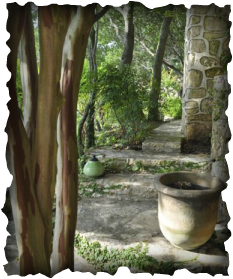 I have always envied writers who make statements like I wrote my first story at the age of five. Or, When I was ten, I began my first novel. Those experiences were not a part of my writing journey. In fact, the opposite was true. I had no idea I wanted to write, or even if I could write, until I had approached fifty years of age. Perhaps I was having a mid-life crisis and didn’t know it. As I look back at that time in my life, I didn’t know myself at all. At the age of thirty I had left teaching second graders behind and became a stay-at-home mom. Years flew by until our two children had gone. One graduated from college as one enrolled. With too much time on my hands, what would I do with all this freedom? For one thing I could travel, and be gone for days, or even weeks, without worrying about teenagers congregating in our empty, and inviting, home. I accompanied my husband to one of his many conferences and looking for a good book to read, visited a nearby bookstore. Normally, I read Historical or literary fiction, but I came back to our hotel room with a book on writing exercises. I began ten-minute segments of free writing. I was astounded at the words that fell across the page, and I was hooked. From there I began writing stories of growing up in Appalachia where daddy was a coal miner and mother managed the company store. My first tiny article, accepted by Blue Ridge Country magazine, was entitled Appalachian Humor. Since that time my articles and stories have found homes in various newspapers and magazines. Now my first novel, At The Bridge, Adventures of Agnes Series, will be released this fall by Lighthouse Publishing of the Carolinas. My mother’s spunky spirit lives on in the character of Agnes Hopper. If you are a writer, how did you begin? "I write poetry with my whole being--especially with my ears and my eyes--and, usually with a pot of coffee." -- Betsy Thorne
|
This page is dedicated to my inspirations and those who have enriched my life along the way.
Archives
August 2016
|
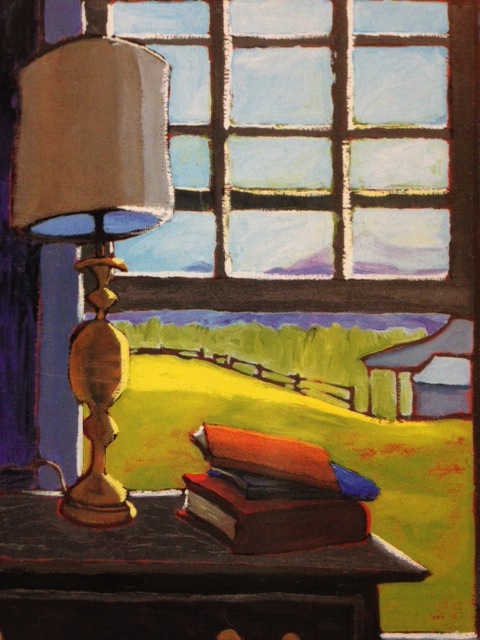
 RSS Feed
RSS Feed